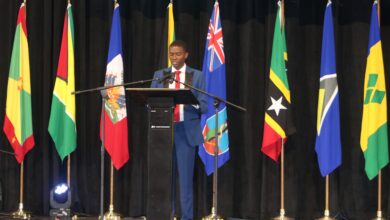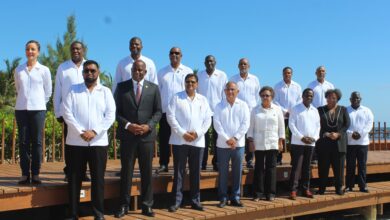We, the Heads of State and Government of the Caribbean Community (CARICOM), at our Thirty-Ninth Regular Meeting of the Conference of Heads of Government of CARICOM on 4 – 6 July 2018 in Montego Bay, Jamaica,
Recalling the CARICOM Declaration for Climate Action made at the Thirty-Sixth Regular Meeting of the Conference of Heads of Government of the Caribbean Community (CARICOM) in July 2015,
Recalling the objectives, principles and commitments of the United Nations Framework Convention on Climate Change (the Convention), the Kyoto Protocol, the Doha Amendment to the Kyoto Protocol and the Paris Agreement,
Recalling further the 2030 Agenda for Sustainable Development (the 2030 Agenda) and its goals,
Reaffirming that Small Island Developing States (SIDS) remain a special case for environment and development, considering their unique and particular vulnerability to the adverse impacts of climate change, as acknowledged in the Convention, the Paris Agreement and by the international community in multiple international fora,
Noting with grave concern that our people are already confronting the negative effects of climate change, including extreme weather events such as hurricanes, especially Irma and Maria, drought; and, in some cases, our ecosystems are approaching the limits of their adaptive capacities,
Recalling with appreciation the humanitarian support provided to CARICOM countries affected by hurricanes and tropical storms in 2017 and the financial commitments made at the CARICOM-UN High-Level Pledging Conference on 21 November 2017 to support their rebuilding efforts,
Alarmed that the Region’s ability to achieve sustainable development in line with the 2030 Agenda will be severely compromised by the failure of the international community to take ambitious climate action to hold the increase in global average temperature to 1.5 degrees Celsius above pre-industrial levels (1.5°C ),
Underscoring thus the imperative to close the gap between the aggregate effect of mitigation targets in nationally determined contributions (NDCs) and the level of effort required to limit the increase in global average temperature to 1.5°C and reiterating further the equally urgent need to enhance the Region’s capacity to adapt to the adverse impacts of climate change and to address permanent loss and damage,
Enhanced global cooperation for urgent and ambitious climate action
Resolute in our commitment to urgent and ambitious action on climate change in order to secure the future of our people,
Now therefore, we, the Heads of State and Government:
Call for a global effort to close the mitigation ambition gap and place the world on pathways for low emissions climate resilient development;
Urge the international community to continue to support the Caribbean in its ongoing efforts to contribute to global efforts to reduce emissions of greenhouse gases and to adapt to the impacts of climate change and build the Region’s resilience;
Emphasize the critical importance of pre-2020 climate action;
Further emphasize the centrality of the Paris Agreement for progressively ambitious climate action and urge universal participation in its implementation;
Commit to accelerate efforts regionally in order that all CARICOM Member States have undertaken the necessary action to ratify the Paris Agreement at the latest by the Conference of Parties to be held in Poland in December 2018 (COP 24);
Towards a successful COP 24
Reflecting upon the specific needs and circumstances of our countries that are particularly vulnerable to the adverse impacts of climate change, we:
Commend the Fiji Presidency for its stewardship of the Twenty-Third Conference of the Parties (COP 23), its commitment to focus international attention on the plight of Small Island and Low-Lying Coastal Developing States (SIDS) and the continued preparatory work for COP 24, including the Talanoa Dialogue and the finalization of the Paris Agreement Work Programme (PAWP);
Encourage Poland in its capacity as the incoming Presidency of COP 24 to maintain international attention on the small island and low-lying coastal developing states and confirm CARICOM’s full support for a successful and ambitious Climate Change Conference;
Look forward to the release in early October of the Inter-Governmental Panel on Climate Change Special Report: Global Warming of 1.5°C and a dedicated space to discuss the implications of the Report prior to COP to better inform the Talanoa Dialogue;
Commit to full participation in the Talanoa Dialogue process, at the national and regional levels, and to the highest level participation in the global process at COP 24, so as to catalyze the necessary political momentum for more ambitious climate action compatible with the 1.5°C temperature limit including through the communication of new and updated NDCs in advance of 2020;
Call for urgent steps to ensure progress in the completion of a holistic and effective Paris Agreement Work Programme by COP 24 that will establish a robust foundation and support all parties in the implementation of their obligations under the Agreement;
Emphasize that loss and damage is an integral pillar of the Paris Agreement and calls for the provision of adequate support to initiatives under the Warsaw International Mechanism (WIM) for Loss and Damage as well as support to enable countries to submit loss and damage proposals to the Green Climate Fund (GCF);
Call on all countries, both developing and developed, to participate actively and meaningfully in discussions to address Loss and Damage, including in the context of the Suva Expert Dialogue on Loss and Damage;
Urge the international community to support the CARICOM in its drive to recapitalize the Caribbean Catastrophe Risk Insurance Facility (CCRIF) as the premiere mechanism that presently addresses loss and damage, in the face of more intense extreme weather events exacerbated by climate change;
Recall the commitment of developed countries to jointly mobilize by 2020 through to 2025, USD100 billion per annum, and urge the announcement, during the High-level Ministerial Dialogue on Climate Finance, of demonstrable efforts to further advance towards meeting the 100 billion goal, while aiming to achieve a balance in the provision of resources for mitigation and adaptation actions and targeting the needs of SIDS for public and grant-based resources for adaptation;
Acknowledge the importance of the availability of a wide variety of sources, instruments and channels for scaling up climate finance and urge the finalization at COP 24 of the necessary decisions to have the Adaptation Fund serve the Paris Agreement;
Also urge the launch of an inclusive process for the first formal replenishment process of the Green Climate Fund (GCF) and the development of a comprehensive resource mobilization strategy informed by the latest science and the urgent needs especially of the Small Island and Low-Lying Coastal Developing States;
Commit to effectively participate in the negotiation process through to COP 24, in order to advance the region’s priorities and to support and supplement positions taken by the Alliance of Small Island States (AOSIS); and
Urge the international community to ensure that the outcomes of COP 24 result in the full and effective operationalisation of the Paris Agreement.





